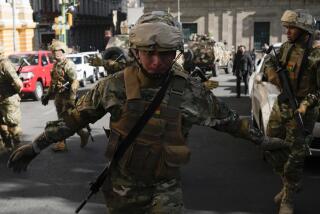Chile’s Army Scolded for ‘Out of Place’ Show of Force : Latin America: President criticizes military for going on alert in May. But democracy not threatened, he adds.
- Share via
SANTIAGO, Chile — President Patricio Aylwin scolded Chile’s army Friday for pressuring his government with a “show of force that is absolutely out of place under the rule of law.”
Units of the army, headed by former dictator Augusto Pinochet, went on alert May 28 while ranking generals wore camouflage uniforms to a meeting, guarded by troops in battle gear.
Aylwin said in a news conference that those actions had not threatened Chile’s fledgling democracy but had caused fear in the population and damage to the country’s international image.
Pinochet and the army are said to be upset over numerous trials involving military men, alleged harassment by a government-owned news media and lack of “fluidity” in relations with the Defense Ministry.
Tensions between the army and Aylwin’s administration have arisen several times since he took office in March, 1990, after 16 1/2 years of military dictatorship under Pinochet. In December, 1990, army troops were temporarily confined to their barracks in an exercise that dramatized similar army complaints.
Aylwin, who met privately with Pinochet on Wednesday, told reporters Friday that he will seek to improve civilian-military contacts. He expressed “confidence that this episode will not repeat itself.”
The president said his meeting with the general took place “in a climate of reciprocal respect,” and he acknowledged that Pinochet has generally observed democratic norms since he handed power over to the civilian government.
But Aylwin said the May 28 actions by the army were an “irregular procedure” with “the manifest purpose of exercising pressure.”
The army made no open complaints that day but startled the nation by deploying special troops with black berets, flak jackets and combat arms around the downtown armed forces building where Pinochet and his generals were meeting, many in camouflage uniforms. Some army units went on alert.
Aylwin, on a trip to Scandinavia at the time, was surprised and embarrassed by the army move. While he was telling the press in Copenhagen that the army and Pinochet were subordinate to a fully democratic government, the president recalled Friday, “events were taking place that give support for doubting that presidential affirmation.”
In the following days, tension subsided as government officials met with army officers. Aylwin scheduled his Wednesday meeting with Pinochet after returning from Europe earlier in the week.
Before the meeting, Pinochet told a Chilean newspaper reporter that “democracy has not been in danger nor is it now.”
Through unofficial spokesmen, the army made it clear it was unhappy over scores of court cases implicating military officers in human rights violations and other crimes under the military regime. Many of the cases are for disappearances and killings before a 1978 pardon of officials for most abuses that took place before the amnesty decree.
The armed forces contend that the amnesty should preclude judicial investigations, but human rights lawyers insist that the cases must be investigated and tried before any amnesty is applied.
Pinochet was also said to be enraged over a May 27 headline across the front page of La Nacion, the government newspaper, that reported the reopening of a court case in which his son is accused of receiving army checks for the equivalent of $3 million in obscure circumstances. La Nacion said eight generals had been subpoenaed in the case.
The son, a civilian also named Augusto, received the checks in the purchase by the army of a bankrupt weapons company in 1989. The younger Pinochet has said the checks were to pay off unidentified creditors of the company.
Another source of friction is an unfriendly relationship between Pinochet and Patricio Rojas, the civilian defense minister. This week Pinochet and other officers complained that the ministry has delayed action on dozens of administrative requests from the army.
Unofficial spokesmen have said the army is also worried about a bill presented by Aylwin to give the president authority for retiring high military officers. Aylwin said Friday he will not ask for urgent treatment of the bill in Congress.
The current constitution, written by Pinochet’s military government, specifies that he may remain as commander of the army until 1997.
More to Read
Sign up for Essential California
The most important California stories and recommendations in your inbox every morning.
You may occasionally receive promotional content from the Los Angeles Times.










